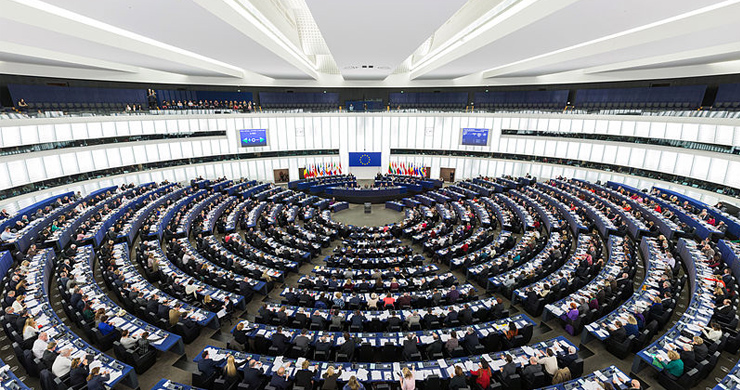2016 – The European Union Referendum Starter
Organise yourselves into 2 groups based on which of the following people you would vote for. Be prepared to explain why you choose your group.
Stay
Carwyn Jones - Labour Party

Image: Carwyn Jones 2011 - National Assembly For Wales / Cynulliad Cymru © Wikimedia Commons under Creative Commons Attribution 2.0 Generic
David Cameron - Conservative Party
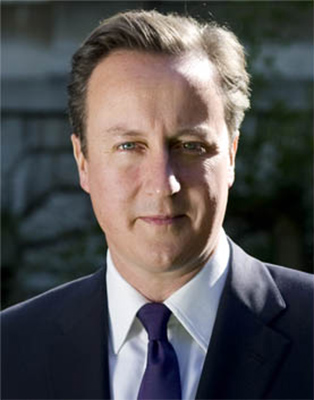
Leave
Andrew RT Davies - Conservative Party

Image: Andrew R. T. Davies - National Assembly For Wales / Cynulliad Cymru © Wikimedia Commons under Creative Commons Attribution 2.0 Generic
Nigel Farage - UKIP

Image: Nigel Farage (2014) - Diliff © Wikimedia Commons under Creative Commons Attribution-Share Alike 3.0 Unported
Investigation – is it best for Wales if the United Kingdom stay in the European Union?
On Thursday 23rd of June there will be referendum on whether the United Kingdom should remain within the European Union (EU).
A referendum is a vote in which nearly everyone (some people are not eligible to vote, see issue 25) of voting age can take part, normally giving a "Yes" or "No" answer to a question. Whichever side gets more than half of all votes cast is considered to have won.
Most of the debate about the United Kingdom leaving the European Union is just that; it is about the United Kingdom. Very little of the debate on TV, online or in the news is about Wales leaving the EU. Hopefully in this edition of GITN we will help to redress that balance.
What is the EU?
Who will be able to vote?
British, Irish and Commonwealth citizens over 18 who are resident in the UK, along with UK nationals living abroad who have been on the electoral register in the UK in the past 15 years are allowed to vote. Unlike in a general election members of the House of Lords and Commonwealth citizens in Gibraltar will also be eligible to vote, Citizens from EU countries - apart from Ireland, Malta and Cyprus - will not get a vote.
How does the UK work KS3 Link - Click below
The Referendum Question
The Electoral Commission which is in charge of making sure that all elections in the UK are fair proposed the wording, which has been accepted by MPs: "Should the United Kingdom remain a member of the European Union or leave the European Union?" The options for voters will be 'Remain a member of the European Union' and 'Leave the European Union'.
The wording of a referendum question is very important as any question with a Yes/No answer can favour the yes option especially if the question is started with “Do you agree….”
What is the European Union?
The European Union (EU) is a partnership involving 28 European countries It began after World War Two to increase economic co-operation. Old enemies thought that countries which trade together are more likely to avoid going to war with each other. The current 28 member countries are:
- Austria (1995)
- Belgium (1958)
- Bulgaria (2007)
- Croatia (2013)
- Cyprus (2004)
- Czech Republic (2004)
- Denmark (1973)
- Estonia (2004)
- Finland (1995)
- France (1958)
- Germany (1958)
- Greece (1981)
- Hungary (2004)
- Ireland (1973)
- Italy (1958)
- Latvia (2004)
- Lithuania (2004)
- Luxembourg (1958)
- Malta (2004)
- Netherlands (1958)
- Poland (2004)
- Portugal (1986)
- Romania (2007)
- Slovakia (2004)
- Slovenia (2004)
- Spain (1986)
- Sweden (1995)
- United Kingdom (1973)
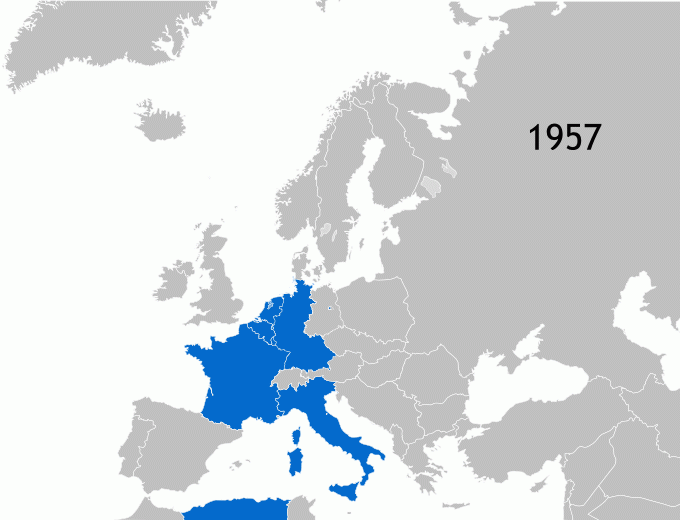
Image: EC-EU-enlargement animation - Kolja21 © Wikimedia Commons under Creative Commons Attribution-Share Alike 3.0 Unported
The EU Countries
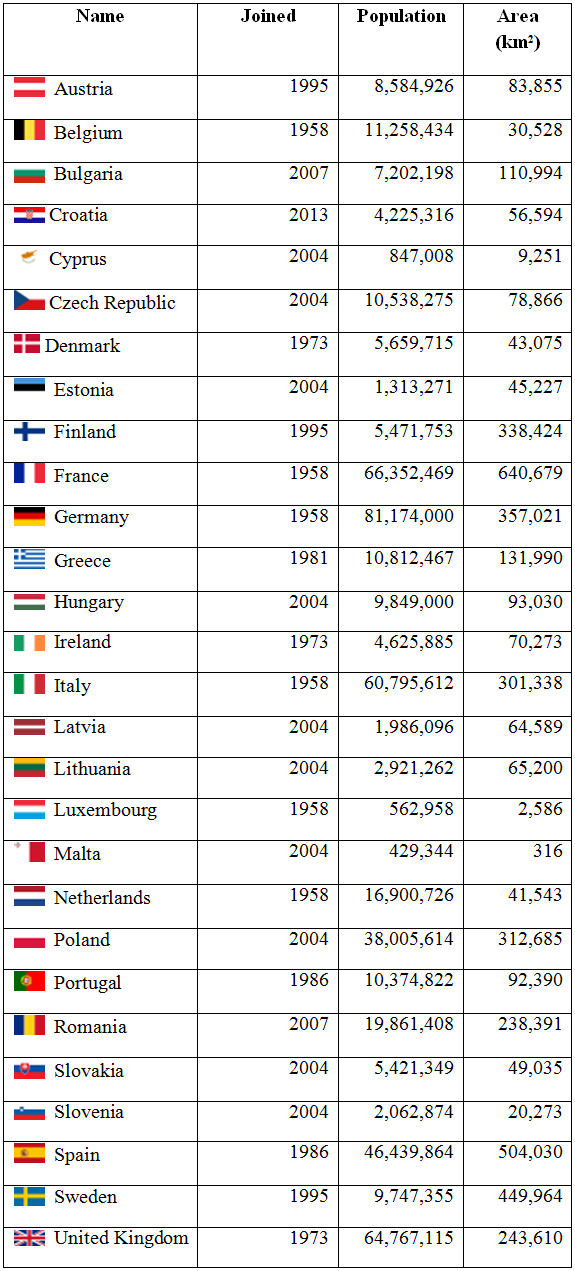
Since the first countries joined in 1958 the EU has grown to become a "single market" allowing goods and people to move around almost as if the member states were one country. Many members share a currency (type of money like our pound), the euro, which is used by 19 of the member countries, it has its own parliament and it now sets rules for many different things such as the environment, transport, consumer rights and even things like mobile phone charges.
BBC Guide on the origins of the EU - Click below
Wales in the EU
The current population of Wales is very close to 3,150,000 (and Cardiff makes up around 358,000 of this population) it has an area of 20,761 km²; compare that to the tables of the member states of the EU above but also compare that to the populations of the largest cities in the EU below.
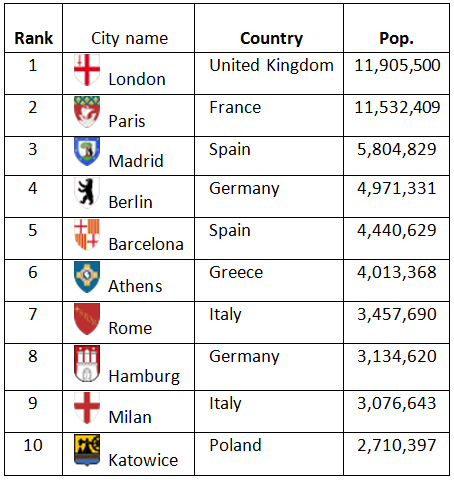
Question
How much of an influence do you think that Wales has in the EU?
Question
How do you think Wales compares in importance to large cities such as London?
Question
How important is it for Wales to make its decisions locally in its own Assembly/Parliament?
Tip
Would Wales get overlooked next to the bigger voices of larger countries and cities if it did not have its own Assembly?
Student Activity
Investigation
First read the rest of the linked resources and use the student resource sheet to help you carry out an investigation of the geography of the 2016 EU Referendum Election. Use it to formulate questions which you can follow up after the results are in for the 2016 vote in June and your own surveys/mock elections of your class, year group or whole school.
Introduction
- In this section you will explain what it is that you are investigating.
- You will choose questions for enquiry that you want to answer.
- You will explain important background information.
- Outline a plan of what you intend to do and what data you will collect.
Results
- Tabulate (put in tables) data.
- Convert the data into easier forms to interpret:
- Use graphs
- Simplify data into things like rounded numbers or a representative mean.
Analysis
- Show how your results answer your questions for enquiry:
- Annotate graphs and diagrams
- Construct paragraphs.
Conclusions
- For each of your enquiry questions what have you found out?
- What is the answer?
Evaluation
- Evaluate your process (how you carried out your investigations (methods)) – what was successful? What went wrong? What could you do differently next time?
- Evaluate your sources – (your information and data) which are reliable and why? Which might be biased and why?
- Evaluate your outcomes – (your conclusions) what is reliable and why? Which may be wrong or inaccurate and why?
- Formulate more questions for a future enquiry based on your findings; this is especially important to find out if your predictions may be correct after the election.
Teacher Box
The resource is designed to be used as whole class resource from the front of the classroom on the projector/interactive whiteboard.
The various graphics should be supported by teacher exposition based on the text which will not be readable in permitted time to the vast majority of pupils), following this it is ideal that the students have access to the online resource in order to work on the activity sheet (designed to be printed on A3 size paper).
Ideally these activities will be supported by the use of a network room, tablets/laptops or students own phones/devices if permitted.
However the activities are also designed to be used in a typical one hour lesson with the teacher input using the resource from the front of the classroom alongside the resource sheet.
Students can then be set a homework task to study the three articles in advance of the following lesson.
The resource and accompanying sheet is designed to support the LNF framework while giving students key geographical knowledge about places in relation to the EU Referendum in 2016.
Pupil Box
Either in class or at home read and complete the activities in the online resource article and in the linked articles in this edition of Geography in the News. Attempt to complete all of the activities in the resource sheet.
What you will learn:
- You will increase your knowledge about the EU referendum in 2016.
- You will increase your understanding of how these factors may affect human beings and human activities
- You will have you the opportunity to learn or practice important literacy and numeracy skills.
You will learn new geographical terms highlighted in purple these should be learned and added to a glossary. A glossary is a list of words and their meanings. You could have one in the back of your geography exercise book, if you have a planner it is probably a good place to keep a glossary, or you may keep a separate glossary or word book. A good glossary helps you build your vocabulary and your literacy. Research meanings using related article content, discussion or a dictionary (either online or a book).
Another issue you may find of interest, Investigating The Welsh Government Elections 2016.


